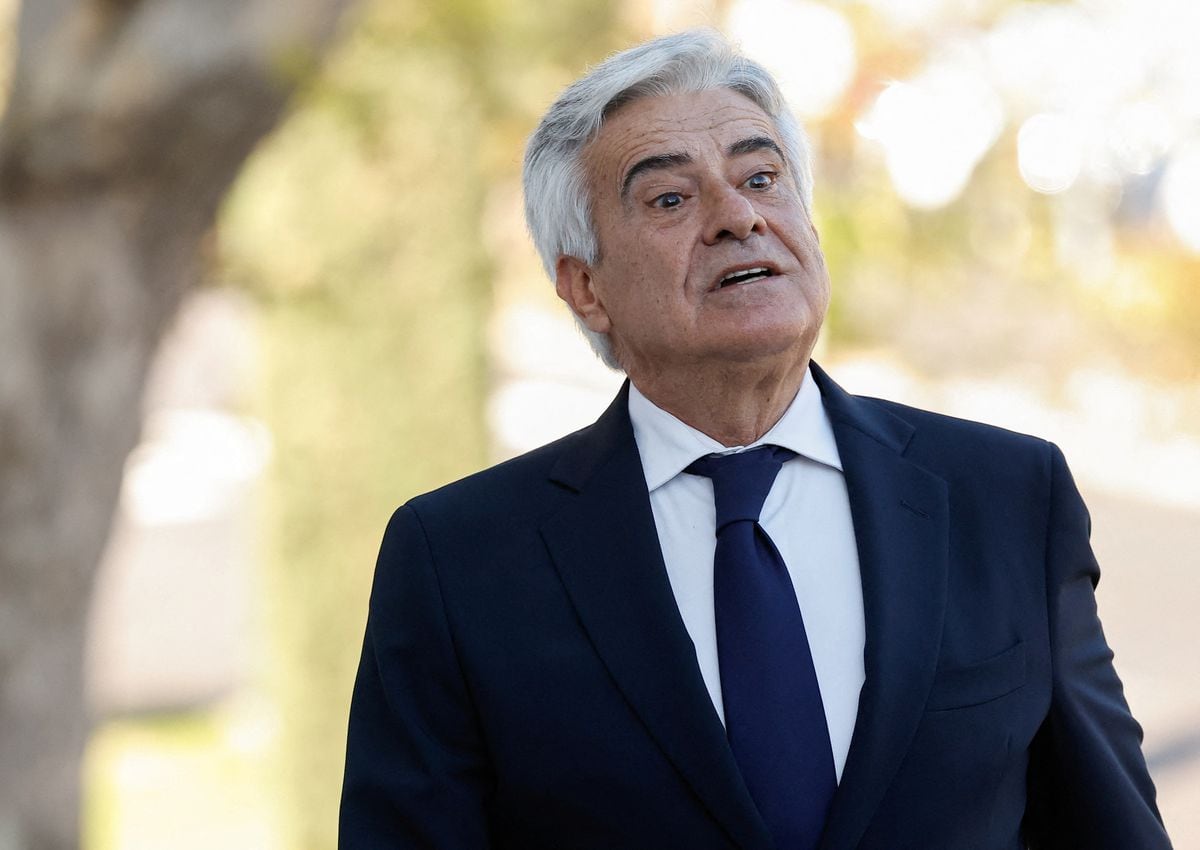“You have to assume the worst”: human rights activist paints a bleak picture of the Olympics
Created: 01/25/2022, 10:30 am
By: Marc Beyer
In China, the floor is quickly wiped again: A worker cleans the floors in the main media center of the Winter Games in Beijing.
© David J. Phillip/AP/dpa
In an interview, Wenzel Michalski, Germany head of Human Rights Watch, talks about the Winter Olympics in China.
The man expresses sharp criticism of the IOC and its President.
Munich – The Winter Olympics begin on February 4th, but this year many observers have had a clouded feeling.
The Beijing venue and China's handling of human rights do not fit Olympia's claim to be a festival of peace.
We spoke to Wenzel Michalski, the Germany head of the human rights organization Human Rights Watch.
Mr Michalski, how excited are you?
Wenzel Michalski:
There is none.
It's depressing to see that our athletes have to travel to a country where they are under total surveillance.
The Games take place in a country with such blatant disregard for human rights and crimes against humanity.
At Human Rights Watch, we have gathered relevant facts, especially in Xinjiang, where people are deprived of their culture, forced to retrain, not speak their language and practice their religion, have forced labor camps, and so on.
The crowning glory was IOC President Thomas Bach, who recently offered himself as a mouthpiece for the Chinese government and helped cover up the horrific disappearance of tennis player Peng Shuai.
Olympic Winter Games in Beijing: For Michalski "a slap in the face of the athletes"
There are also athletes who share this discomfort.
Olympic luge champion Felix Loch travels to Beijing with the resolution "One more time and then never again".
Michalski:
I can well imagine that.
If I were an athlete now, it would also be a burden for me to have to go there.
That's why it's actually a slap in the face for the IOC to force athletes to show what they've been preparing for in this country.
One has the feeling at the IOC that there is hardly any awareness of human rights anymore.
Michalski:
It's shocking, especially since the IOC has repeatedly said they will respect human rights.
They have also given themselves a corresponding catalog – which they are not sticking to now.
Vice-President Pound says he doesn't know if any violations are taking place there at all.
You have to hold your forehead.
What drives the IOC?
Michalski:
I don't think that Mr. Bach lives in a bubble and believes everything in a daze.
He knows exactly what he's doing there.
He has financial reasons, and if he says in advance that the Olympics could have taken place in Bavaria, but they didn't want to, then those are excuses.
And if they then also produce their Olympic uniforms in China and don't even check whether they contain cotton from Xinjiang, the largest supplier, then that's the sour cherry, so to speak, that they put on their caked cake.
Sports federations argue the competitions focus on one country and help improve the situation.
Michalski:
But that's not true.
In China, even without the Olympic Games (click here for the schedule), everyone knows how terrible the situation there is.
We can experience live what is happening in Hong Kong.
We don't need the sport for that.
And if they claim that, then they have to comment on it accordingly.
That's the disappointing thing, that the sports officials don't say anything about the human rights situation, don't show concern.
That is cowardice, laziness, actually a case of venality.
Thomas Bach is the President of the IOC.
© Jean-Christophe Bott/KEYSTONE/dpa
Olympic Games return to China: "It's so out of date"
What has improved since the 2008 Olympics in China?
Michalski:
Nothing at all.
Back then, the system was relatively gentle compared to today.
There were terrible reports back then too.
People have disappeared into prisons, religious minorities have been persecuted, Tibetans oppressed.
But especially since Xi Jinping became president, things have gotten a lot worse.
We could see all that.
And that happened right after the Olympics.
What does it mean if the Winter Games also go to Beijing?
Michalski:
(thinks for a long time) I can't find a way to describe this decision.
This is only understandable when you consider that these people like to surround themselves with powerful people and don't turn down a lot of money.
One gets the impression that the world has sharpened its focus on human rights violations.
Is sport an island of ignorance?
Michalski:
Yes.
There are now advances in Germany and increasingly in Europe and many other countries, such as the Supply Chain Act, which obliges companies to comply with human rights.
The big sports federations are nothing but big companies.
That's actually what they mean.
They would have to comply, and they don't.
In recent years I haven't seen any CEOs, managing directors, chairmen of large companies who have their picture taken with Xi Jinping or give him any medals like Mr. Bach did.
This is so out of date!
That actually belongs in the 20th century.
Could it be that the IOC simply doesn't care what reputation it has in the western world?
Michalski:
That's right.
Many officials come from countries where they can enjoy human rights.
For example Thomas Bach, who experiences a great deal of freedom in Germany.
I can imagine they are so hard-bodied because they are applauded by that part of the world where autocracies rule.
They enjoy their freedom in one part of the world, but earn their credit and money in the other.
That's incredibly cynical.
Is the IOC a hopeless case?
Michalski:
There is always the possibility of renewal.
But in this cast they are not capable of that.
When Thomas Bach started, colleagues of mine met him.
He was also told: "You now have a chance to prove that sport works for good."
And?
Michalski:
Nothing happened.
Except that the IOC has given itself human rights guidelines.
That was a glimmer of hope.
But they did it so cleverly - from 2022, when the following games will take place in Paris, Milan or Los Angeles.
This is easier to deal with.
Olympia 2022: what dangers high-ranking officials face when visiting China
China's goal is to present itself on the big stage as a modern, powerful nation.
What can you counter the propaganda show?
Michalski:
If the media follow this event critically, that does have an impact.
Politics has also jumped in now.
It is important that no senior official from Western countries travel to Beijing to wave next to Xi Jinping.
But not a sports official either.
Mr. Bach will of course do it, but it would be important that no one from the DOSB stands up for it.
Whoever does this must be aware that they are making themselves a tool of propaganda and thus of strengthening the regime.
Xi Jinping needs these games.
What the world says doesn't really matter to him, but internally the games are important.
He wants to stimulate national sentiment so that people don't rebel.
What do you specifically expect from the German Olympic Sports Confederation?
Michalski:
I expect the DOSB to protect the critical athletes there from attacks.
In Beijing itself, in front of the Chinese.
They could be pressured or even worse they could end up in jail.
Do you really think it might come to that?
Michalski:
You have to assume the worst, we saw that in the Peng Shuai case.
Second, I expect the DOSB to protect its athletes from any pressure from the IOC.
Those who want to say and say something must be able to do so.
Was a sporting boycott ever a realistic scenario?
Michalski:
I don't think so.
The athletes really can't help it that their associations send them to such countries.
But a political and diplomatic boycott is the least one can ask for.
Does the China really hurt?
Michalski:
Not internally.
Censorship in China is so massive that even the word “tennis” was blocked on the Internet during the Peng Shuai affair.
And to the outside?
Michalski:
Of course, the Chinese government attaches great importance to being perceived positively.
You have very expansive desires with your Silk Road projects, you are very involved in African countries, partly also in European ones like Greece or Hungary.
It doesn't look so good on television if there's only Putin, Lukashenko and others of that ilk.
That is a strong signal: the dictators among themselves!
And Thomas Bach.
Michalski:
If at some point he looks at the pictures in his photo album and then only sees himself next to some tyrant... It can't be so nice to show it to the grandchildren at some point: look, grandpa!
Wenzel Michalski is the director of Human Rights Watch Germany.
© Christoph Soeder/dpa
Winter Olympics: "Maybe time to rethink the product"
There were anti-Olympic referendums in Bavaria and Switzerland.
Beijing and the capital of Kazakhstan remained as candidates for 2022.
Is that a lever for the West?
Michalski:
That will become apparent in the next awards.
With more and more democratic countries rejecting this monstrosity, it may be time to reconsider the product.
Does it always have to be the biggest jump?
In the nature park?
And ice channels that then spoil the landscape unused.
Michalski:
Bavaria is a country that is enthusiastic about winter sports.
And yet you said: “Olympics?
Please not here!” That says it all.
The games have become so megalomaniacal that democratic countries no longer want to do this to themselves.
If there are to be no more authoritarian games in the future, the IOC will have to consider taking a step down.
That wouldn't harm the sporting enthusiasm.
From February 4 to 20, 2022, the Winter Olympics will take place for the 24th time in sports history.
For 16 days, the Chinese metropolis Beijing will be the center of attention.
I
nterview: Marc Beyer


/cloudfront-eu-central-1.images.arcpublishing.com/prisa/3YAXWGVZTFB6LAZHB6LUMQHDZI.JPG)

/cloudfront-eu-central-1.images.arcpublishing.com/prisa/F5GRV7HUTZACRHBAVHSBBMKKFM.jpg)









